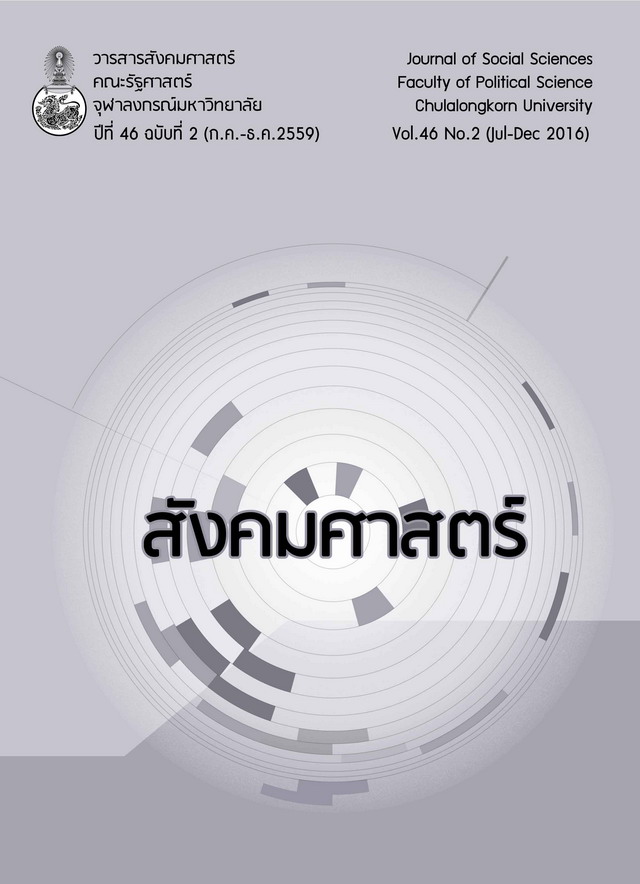ความสัมพันธ์ด้านความมั่นคงระหว่างญี่ปุ่นกับอินเดีย ในโครงสร้างอำนาจที่เปลี่ยนแปลงไป
DOI:
https://doi.org/10.61462/cujss.v46i2.1214คำสำคัญ:
ความสัมพันธ์ญี่ปุ่น–อินเดีย การทะยานขึ้นของจีน สหรัฐอเมริกา โครงสร้างอำนาจ การถ่วงดุลภัยคุกคามบทคัดย่อ
ความท้าทายที่เพิ่มขึ้นในศตวรรษที่ 21โดยเฉพาะการทะยานขึ้นมาของจีนที่มียุทธศาสตร์เพิ่มแสนยานุภาพทางทะเลเป็นปัจจัยผลักดันให้ญี่ปุ่นกับอินเดียหันมากระชับความสัมพันธ์ระหว่างกันโดยยกระดับความสัมพันธ์เป็นหุ้นส่วนเชิงยุทธศาสตร์ (Strategic partnership)และหุ้นส่วนระดับโลก (Global partnership)ทั้งนี้ ทั้งสองประเทศมีความกังวลเกี่ยวกับท่าทีที่แข็งกร้าวของจีนในข้อพิพาทดินแดนในทะเลจีนตะวันออกและทะเลจีนใต้ ตลอดจนความพยายามของจีนที่จะขยายเขตอิทธิพลทางทะเลมายังมหาสมุทรอินเดียผ่านทางเมียนมาและปากีสถานด้วยความสัมพันธ์ญี่ปุ่น–อินเดียที่เพิ่มขึ้นนี้สามารถวิเคราะห์ได้ด้วยทฤษฎีสัจนิยมเชิงโครงสร้าง (Structural realism) และการถ่วงดุลภัยคุกคาม (Balance of threat) เพราะโครงสร้างอำนาจระหว่างประเทศที่เปลี่ยนแปลงไปในลักษณะที่จีนเข้มแข็งขึ้นมากทั้งด้านเศรษฐกิจและการทหาร ทำให้ญี่ปุ่นกับอินเดียเพิ่มความร่วมมือกันด้านความมั่นคงในฐานะประเทศมหาอำนาจภายในภูมิภาคที่มีศักยภาพในการถ่วงดุล (Balancing) ต่อจีน ขณะเดียวกันก็ร่วมขบวน (Bandwagon) กับสหรัฐอเมริกาและออสเตรเลียในฐานะประเทศที่ยึดถือค่านิยมสากลโดยเฉพาะประชาธิปไตยเพื่อคานอำนาจและลดทอนอิทธิพลของจีนด้วย
Downloads
เอกสารอ้างอิง
Arif, Sheikh Mohd. 2013. A history of Sino–Indian relations: From conflict to cooperation. International Journal of Political Science and Development 14(4): 129–137.
Brewster, David. 2010. The India–Japan security relationship: An enduring security partnership? Asian Security 6(2): 95–120.
Borah, Rupakjyoti. 2012. Japan–India maritime cooperation in the Asia-Pacific region: Prospects and problems. Gujarat: Pandit Deendayal Petroleum University.
Chaiwat Khamchoo. 2006. Nayobai khong prathet Yipun: Khwamtonueang lae khwamplianplaeng. [Japan’s foreign policy: Continuity and change]. Bangkok: Lake and Fountain Printing. (in Thai)
Garg, Vinay. 2007. Indian navy tests mettle in the Malabar exercise. India Strategic, September. http://www.indiastrategic.in/topstories46.htm (Accessed on April 14, 2015)
Ghosh, Madhuchanda. 2008. India and Japan’s growing synergy: From a political to a strategic focus. Asian Survey 48(2): 282–302.
Gokhale, Nitin A. 2014. Modi, Japan and diplomatic balancing. The Diplomat, September 3. http://thediplomat.com/2014/09/modi-japan-and-diplomatic-balancing/ (Accessed on July 10, 2015)
Hanns Seidel Stiftung (HSS). 2015. U.S. President Barack Obama’s visit to India. http://www.hss.de/fileadmin/india/downloads/US_President_Barack_Obama_s_Visit_to_India.pdf. (Accessed on October 30,
Jain, Purnendra. 2010. Japan-India Relations: Peaks and Troughs. The Round Table: The Commonwealth Journal of International Affairs 99(409): 403–412.
-----. 2008. Westward ho! Japan eyes India strategically. Japanese Studies 28(1): 15–30.
Jha, Saurav. 2014. Xi Jinping in India: A breakthrough in relations? The Diplomat, September 18. http://thediplomat.com/2014/09/xi-jinping-in-india-a-breakthrough-in-relations/ (Accessed on October 20, 2015)
Joshi, Sanjana. 2001. Prospects for security cooperation between India and Japan. Strategic Analysis 25(2): 185–196.
Kesavan, K. V. 2010. India and Japan: Changing dimensions of partnership in the post-Cold War period. New Delhi: Observer Research Foundation.
Khan, Shamshad A. 2011. Indo–Japan strategic cooperation: Issues, expectations and challenges. Sapporo: Slavic-Eurasian Research Center.
Kerr,Paul K., Michael F. Martin, and Bruce Vaughn. 2011. India: Domestic issues, strategic dynamics, and U.S. relations. Congressional research service. https://www.fas.org/sgp/crs/row/RL33529.pdf. (Accessed on March 22, 2015)
Lee, Lavina and John Lee. 2016. Japan–India cooperation and Abe’s democratic security diamond: Possibilities, limitations and the view from Southeast Asia. Contemporary Southeast Asia 38(2): 284–308.
Madcalf, Rory. 2013. Shinzo Abe’s strategic diamond.The Diplomat, January 15.
http://thediplomat.com/2013/01/shinzo-abes-strategic-diamond/ (Accessed on December 4, 2015)
Malone, David M. and Rohan Mukherjee. 2009. India–US relations: The shock of the new. International Journal 64(4): 1057–1074.
Mathur, Arpita. 2012. India–Japan relations: Drivers, trends and prospects. Singapore: S.Rajaratnam School of International Studies, Nanyang Technological University.
Mearsheimer, John J. 2013. Structural realism. In International relations theories: Discipline and diversity, eds. Tim Dunne, Milja Kurki, and Steve Smith, 77–93. 3rded. Oxford: Oxford University
Press.
Ministry of Foreign Affairs of Japan (MOFA). 2016. Japan–India relations. http://www.mofa.go.jp/region/asia-paci/india/index.htm/. (Accessed on July 25, 2016)
Nagao, Satoru. 2016. The importance of Japan–India nuclear cooperation. Japan Perspectives 16: 28–33.
-----. 2013. Japan–India military partnership: India is the new hope for Asia. CLAWS Journal (Winter): 57–78.
Nakanishi, Hiroaki. 2015. Japan–India civil nuclear energy cooperation: Prospects and concerns. Journal of Risk Research 18(8): 1083–1098.
Nandakumar, J., and A. Vinod Kumar. 2007. India–Japan relations: Are there prospects for civil nuclear cooperation? Strategic Analysis 31(6): 973–984.
Panda, Rajaram. 2010. India and Japan: Exploring strategic potentials. Journal of Defense Studies 4(4): 89–107.
-----. 2012. India–Japan defense partnership. Indian Foreign Affairs Journal 7(3): 311–320.
Parameswaran, Prashanth. 2015. India, Japan and Australia: A trilateral in the making? The Diplomat.
http://thediplomat.com/2015/06/india-japan-and-australia-a-trilateral-in-the-making/. (Accessed on June 30, 2015)
Rath, Saroj Kumar. 2010. India–Japan: Partners against terrorism. World Affairs 14(1): 138–143.
Sato, Takahiro. 2012. Economic relations between India and Japan. Eurasian Geography and Economics 53(4): 457–478.
Walt, Stephen. 1987. Theorigins of alliances. Ithaca, NY: Cornell University Press.
Waltz, Kenneth N. 1979. Theory of international politics. Boston, MA: Addison-Wesley.
Yoshimatsu, Hidetaka. 2012. Japan’s China policy in domestic power transition and alliance politics. Asian Affairs: An American Review 39(2): 106–126.
ดาวน์โหลด
เผยแพร่แล้ว
รูปแบบการอ้างอิง
ฉบับ
ประเภทบทความ
สัญญาอนุญาต
ลิขสิทธิ์ (c) 2016 คณะรัฐศาสตร์ จุฬาลงกรณ์มหาวิทยาลัย

อนุญาตภายใต้เงื่อนไข Creative Commons Attribution-NonCommercial-NoDerivatives 4.0 International License.
เงื่อนไขการอนุญาตสาธารณะ
นโยบายลิขสิทธิ์และการอนุญาต
วารสารสังคมศาสตร์ จุฬาลงกรณ์มหาวิทยาลัย เผยแพร่เนื้อหาทั้งหมดภายใต้ สัญญาอนุญาตครีเอทีฟคอมมอนส์แบบแสดงที่มา-ไม่ใช้เพื่อการค้า-ไม่ดัดแปลง 4.0 นานาชาติ (CC BY-NC-ND 4.0)
ลิขสิทธิ์
บทความทั้งหมดที่ตีพิมพ์ในวารสารสังคมศาสตร์ จุฬาลงกรณ์มหาวิทยาลัย เป็นลิขสิทธิ์ของ คณะรัฐศาสตร์ จุฬาลงกรณ์มหาวิทยาลัย ผู้เขียนจะโอนสิทธิ์ทั้งหมดให้แก่วารสารเมื่อบทความได้รับการตอบรับให้ตีพิมพ์
สัญญาอนุญาต CC BY-NC-ND 4.0
ภายใต้สัญญาอนุญาตนี้:
-
แสดงที่มา (BY): ผู้ใช้ต้องแสดงที่มาโดยอ้างอิงถึงผู้เขียน คณะรัฐศาสตร์ จุฬาลงกรณ์มหาวิทยาลัย และวารสารสังคมศาสตร์ จุฬาลงกรณ์มหาวิทยาลัย พร้อมทั้งให้ลิงก์ไปยังสัญญาอนุญาต และระบุหากมีการเปลี่ยนแปลง ทั้งนี้สามารถทำได้ในลักษณะที่สมเหตุสมผล แต่ต้องไม่ทำในลักษณะที่แสดงว่าผู้อนุญาตให้การรับรองผู้ใช้หรือการใช้งานดังกล่าว
-
ไม่ใช้เพื่อการค้า (NC): ผู้ใช้ไม่สามารถใช้เนื้อหาเพื่อวัตถุประสงค์ทางการค้า การใช้งานเชิงพาณิชย์จะต้องได้รับอนุญาตเป็นลายลักษณ์อักษรล่วงหน้าจากผู้เขียนและคณะรัฐศาสตร์ จุฬาลงกรณ์มหาวิทยาลัย
-
ไม่ดัดแปลง (ND): หากผู้ใช้นำเนื้อหาไปรวม ดัดแปลง หรือต่อยอด ผู้ใช้ไม่สามารถเผยแพร่งานที่ดัดแปลงนั้นได้ การดัดแปลงผลงานจะต้องได้รับอนุญาตเป็นลายลักษณ์อักษรล่วงหน้าจากผู้เขียนและคณะรัฐศาสตร์ จุฬาลงกรณ์มหาวิทยาลัย
นโยบายการเข้าถึงแบบเปิด
วารสารสังคมศาสตร์ จุฬาลงกรณ์มหาวิทยาลัย ให้การเข้าถึงเนื้อหาแบบเปิดโดยทันทีตามหลักการที่ว่าการทำให้งานวิจัยสามารถเข้าถึงได้อย่างเสรีแก่สาธารณะจะสนับสนุนการแลกเปลี่ยนความรู้ในระดับโลก ผู้ใช้สามารถอ่าน ดาวน์โหลด คัดลอก เผยแพร่ พิมพ์ ค้นหา หรือเชื่อมโยงไปยังเนื้อหาฉบับเต็มของบทความได้โดยไม่ต้องขออนุญาตล่วงหน้าจากผู้จัดพิมพ์หรือผู้เขียน ทั้งนี้เป็นไปตามสัญญาอนุญาต CC BY-NC-ND 4.0
นโยบายการเก็บบันทึกด้วยตนเอง
ผู้เขียนสามารถเก็บบันทึกบทความฉบับตีพิมพ์สุดท้าย ต้นฉบับที่ส่ง (preprint) หรือฉบับที่ผ่านการประเมิน (postprint) ในคลังสถาบันหรือเว็บไซต์ส่วนตัวได้ โดยต้องมีการอ้างอิงการตีพิมพ์ครั้งแรกในวารสารสังคมศาสตร์ จุฬาลงกรณ์มหาวิทยาลัย พร้อมระบุแหล่งอ้างอิงที่สมบูรณ์และลิงก์ไปยังเว็บไซต์ของวารสาร
การขออนุญาต
สำหรับการใช้งานนอกเหนือจากที่ครอบคลุมโดยสัญญาอนุญาต CC BY-NC-ND 4.0 กรุณาติดต่อ:
กองบรรณาธิการ
วารสารสังคมศาสตร์ จุฬาลงกรณ์มหาวิทยาลัย
คณะรัฐศาสตร์ จุฬาลงกรณ์มหาวิทยาลัย
Email: cusocscij@gmail.com
สำหรับข้อมูลเพิ่มเติมเกี่ยวกับสัญญาอนุญาตครีเอทีฟคอมมอนส์แบบแสดงที่มา-ไม่ใช้เพื่อการค้า-ไม่ดัดแปลง 4.0 นานาชาติ กรุณาเยี่ยมชม: https://creativecommons.org/licenses/by-nc-nd/4.0/deed.th





